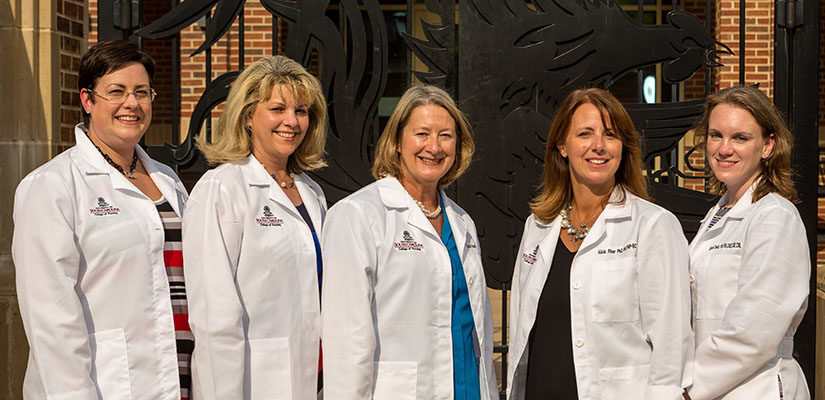Kristen Starnes-Ott, associate dean of academics, earned a bachelor’s degree in biology from East Carolina
University, a
B.S.N. from Auburn University, an M.S.N. in nurse anesthesia from the University of
Southern California and a doctoral degree in nursing from the University of Texas
Health Science Center at Houston. During her doctoral work, she was named the AANA
Foundation New York Life Doctoral Fellow and received the Outstanding Doctoral Award
from the Zeta Pi Chapter of Sigma Theta Tau. Her research interest focuses on using
simulation technology to improve provider communication and impact patient safety
outcomes in perioperative care systems. She co-authored and produced the video “21st
Century Simulation Innovation in Education & Research,” which received the Award of
Merit-Best Shorts Competition in 2012. She has served on numerous state and national
professional organizations, committees and taskforces, including the American Association
of Nurse Anesthetists Education and Continuing Education committees.
Cindy Corbett, formerly associate dean of research and interim chancellor for research at Washington State University Spokane, has joined USC as a SmartState Endowed Chair research professor. Corbett focuses on strategies to improve chronic illness self-management and patient safety and has received funding from the American Society of Health-System Pharmacists’ Research and Education Foundation, the Robert Wood Johnson Foundation, the Agency for Healthcare Research and Quality, the National Institutes of Health and the Patient Centered Outcomes Research Institute. She is a fellow in the American Academy of Nursing and a member of the Western Institute of Nursing.
Robin Dail, associate dean of faculty affairs and practice, earned an associate degree in nursing
from the University of Nevada, Las Vegas, an M.S.N. as a neonatal nurse practitioner
from East Carolina University and a doctoral degree in nursing from the University
of North Carolina, Chapel Hill. Dail comes to USC’s College of Nursing from Duke University’s
School of Nursing and School of Medicine. Inducted into the American Academy of Nursing
in 2014, Dail practiced as a neonatal nurse and neonatal nurse practitioner for 30
years before beginning her academic career. She studies thermal stability in premature
infants to reduce morbidity and mortality related to hypothermia in this vulnerable
population.
Alicia Ribar, assistant dean of graduate programs, has practiced professional nursing for 25 years
and has more than 19 years of advanced practice nursing experience. She earned a B.S.N.
degree from the University of Toledo, Medical College of Ohio, and subsequently worked
in several clinical settings. In 1998, she completed an M.S.N. at Wright State University,
becoming a family nurse practitioner. Ribar is certified as a family nurse practitioner
by the American Nurses Cre- dentialing Center and
is recognized as an advance practice nurse by the Ohio and South Carolina Boards of
Nursing. In 2012, she completed her doctoral degree in nursing at Duquesne University,
concen- trating in epidemiology and transcultural health disparities. She has had
active clinical practices in both acute care and primary care pediatric/family practice
settings and currently maintains a clinical practice delivering health care for the
Division of Inpatient Services at the Department of Mental Health of South Carolina.
Rachel Onello, director of the Clinical Simulation Lab, has more than nine years of experience
in clinical simulation education with formal education from the Peter M. Winter Institute
for Simulation, Education and Research at the University of Pittsburgh and the Center
for Medical Simulation at Harvard University. She comes to Carolina from the University
of Maryland, where she was the assistant director of the simulation lab and taught
clinical and simulation courses to undergraduate and graduate students. Onello’s main
area of interest is in faculty development, particularly around simulation design
integration and debriefing, in simulation-based encounters and also in facilitating
debriefing style feedback conversations in clinical learning environments.
